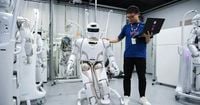The rapid development of artificial intelligence (AI) is not only driving a wave of technological innovation but also intensifying the competition for talent among global tech corporations. In China, the race to attract AI specialists, particularly those capable of building advanced large language models (LLMs), has reached unprecedented levels. Major players like Xiaomi and Alibaba are ramping up their research efforts, reflecting a broader trend that has seen the demand for AI expertise extend beyond the tech sector.
According to a report by the Straits Times, Chinese companies are significantly increasing their spending to lure AI talent, even resorting to poaching from competitors and expanding their search internationally. The urgency of this talent hunt has been fueled by the success of DeepSeek, a Chinese AI startup that has made waves globally with its open-source reasoning model. This success has led to a stock sell-off in American tech companies, highlighting the competitive landscape.
Data from the recruitment platform Zhilian Zhaopin reveals that applications for AI engineer positions in China surged by 69.6% during the first week of the Spring recruitment season starting February 4, 2025. However, the domestic workforce can only satisfy about one-third of the projected need for 6 million AI specialists by 2030, resulting in a staggering shortfall of approximately 4 million workers in the field.
This talent shortage is not confined to China. In the United States, where AI research and development have traditionally flourished, the demand for AI experts is also skyrocketing. LinkedIn's "Jobs on the Rise" report for 2025 indicates that positions such as AI engineer and AI consultant are among the fastest-growing jobs in the U.S., with a 74% increase in demand over the past four years. Projections suggest that the need for tech experts in the U.S. will grow from 6 million jobs in 2023 to 7.1 million by 2034, further amplifying reliance on AI to fill the expanding labor gap.
The competition for AI talent in Silicon Valley is not a new phenomenon, but the rapid advancement of AI technologies has escalated this competition to new heights. According to a report by Fortune, there are fewer than 1,000 truly exceptional AI experts globally. These individuals possess the skills necessary to design, train, and deploy some of the most powerful AI models, making them highly sought after by tech companies.
Top executives, including Meta's Mark Zuckerberg and Google's Sundar Pichai, are personally involved in the recruitment process, attempting to persuade AI experts to join their teams. Apple has successfully recruited at least 36 AI experts from Google since 2018, including Ian Goodfellow, a leading AI researcher who later returned to Google in 2022.
To attract and retain AI talent, tech companies are offering substantial compensation packages. An AI engineer with a Ph.D. and five years of experience at major firms can command a base salary of up to $350,000 per year, significantly higher than salaries in other tech sectors. Additionally, top AI scientists at startups during fundraising rounds can receive stock options valued between $2 million to $4 million.
As the competition for AI talent intensifies, leading tech firms like Google, Meta, Apple, and OpenAI are not showing signs of slowing down. Rob Biederman, a leader at the venture capital firm Asymmetric, noted, "The longer you work in tech, the more you realize that talent is the only thing that matters. Top companies are always looking for ways to monopolize talent." This sentiment underscores the critical importance of securing skilled professionals as the industry evolves.
Meanwhile, in Southeast Asia, a recent report from Lazada indicates that Vietnam and Indonesia are leading in AI application for online business, each reaching 42%. Singapore and Thailand follow closely, each at 39%. This reflects a growing understanding of AI among online sellers in Vietnam, where 77% of surveyed individuals reported familiarity with the technology, surpassing the regional average of 68%.
Pham Minh Tuan, a representative of a household goods business on Shopee, utilizes AI tools like ChatGPT and Grok to track market trends and analyze buyer behavior, resulting in a revenue increase of 7% to 10%. Similarly, Nguyen Thu Ha, a fashion store owner, employs AI applications for designing banners, writing product descriptions, and automating customer responses, allowing her store to operate 24/7 and reduce operational costs.
Despite these advancements, skepticism remains about the effectiveness of AI technology. Although 89% of survey participants acknowledge that AI enhances work efficiency, nearly two-thirds express doubts. This skepticism arises from a lack of tools or knowledge to quantitatively assess the value AI brings. Moreover, the costs associated with accessing quality AI tools remain a barrier, particularly for small businesses.
PGS-TS Nguyen Thanh Hien, founder of NewAI, emphasizes that AI tools are becoming increasingly intelligent and are essential assistants for online sellers. However, he cautions that AI is not a universal solution; it requires accurate data to function effectively. Concerns over data security also loom large, especially as many users rely on free AI tools of uncertain origin.
In summary, the ongoing race for AI talent is a complex interplay of demand, innovation, and competition, with significant implications for both the technology sector and the broader economy. As companies strive to secure the brightest minds in AI, the landscape will continue to evolve, driven by the need for expertise in a rapidly changing world.





